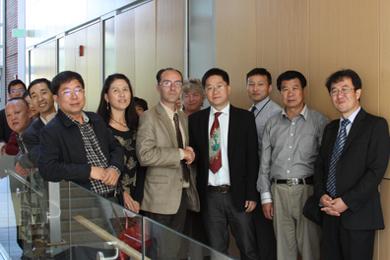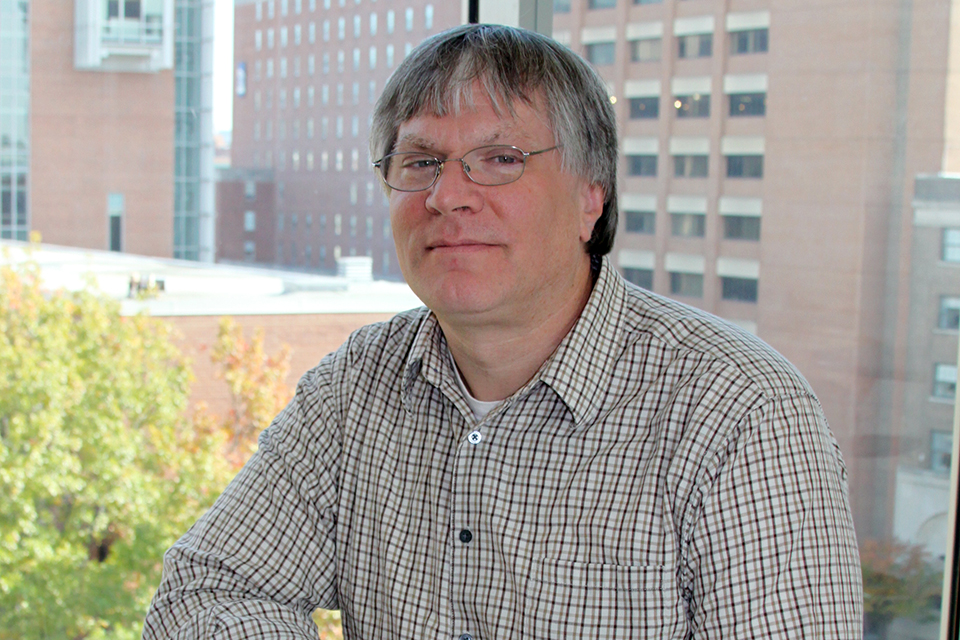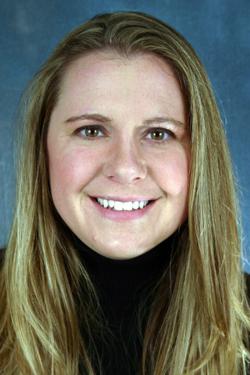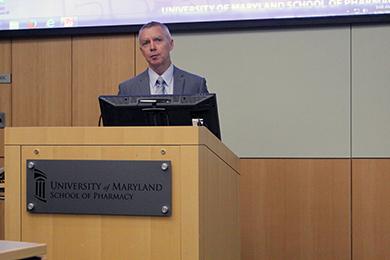SOP Faculty Meet with Chinese Delegation, Discuss Potential Collaboration
Members of the Botanical Society of Yunnan, China and the State Key Laboratory of Phytochemistry and Plant Resources at the Kunming Institute of Botany visit School to share their work and learn about the School’s ongoing research.

By Malissa Carroll
October 2, 2013
On Sept. 20, faculty from the Department of Pharmaceutical Sciences (PSC) welcomed members of the Botanical Society of Yunnan, China and the State Key Laboratory of Phytochemistry and Plant Resources at the Kunming Institute of Botany to the University of Maryland School of Pharmacy. Hosted by Yan Shu, PhD, assistant professor in PSC, the visit offered the delegation a unique opportunity to learn about ongoing research at the School of Pharmacy and meet with faculty members to discuss potential collaborations.
“The University of Maryland School of Pharmacy leads pharmacy education, scientific discovery, patient care, and community engagement in the state of Maryland and beyond,” said Natalie D. Eddington, PhD, FCP, FAAPS, dean and professor of the School of Pharmacy, who greeted the delegation after their arrival. “Our Department of Pharmaceutical Sciences encompasses the entire spectrum of drug development, from drug design and discovery to evaluation and clinical trials. I hope that you find the information shared with you today to be helpful and will look to the School of Pharmacy for future collaborations.”
Andrew Coop, PhD, professor and chair of PSC, also addressed the delegation. He introduced them to the cutting-edge facilities and technologies available within the department, as well as ongoing research initiatives.
Coop spotlighted the Mass Spectrometry Facility at the School, which offers researchers from the School and surrounding research community the opportunity to perform a wide range of sophisticated experiments. It provides state-of-the-art expertise, methodology, and instrumentation to researchers and collaborates with faculty, staff, and students on a variety of research projects.
“After opening the new Pharmacy Hall Addition in 2010, the School of Pharmacy made a strategic investment in mass spectrometry,” said Coop. “We now house approximately 13 mass spectrometers in this building and have recruited a renowned biological mass spectrometry expert, David Goodlett, PhD, to oversee this facility.”
Because the primary research efforts of delegation members focused on the study of natural drugs, Coop also discussed his department’s efforts to develop compounds derived from natural sources to treat a wide range of diseases. He reviewed the research of Jia Bei Wang, PhD, professor in PSC, who is working with colleagues in China to perform pre-clinical and small-scale safety and efficacy studies of the compound l-tetrahydropalmatine (l-THP), a molecule originally discovered in the extract of Chinese herbs, as a treatment for cocaine addiction.
Following Coop’s presentation, several members of the delegation presented research from their laboratories, which spanned four major fields, including plant evolutionary biology, phytochemistry and chemical biology, plant genomics, and conservation biology.
Xiaodong Luo, PhD, associate dean of the State Key Laboratory of Phytochemistry and Plant Resources at the Kunming Institute of Botany, approached the podium first and presented an overview of his team’s research on indolent alkaloids.
“There are many indolent alkaloids found in nature, and approximately 63 current antitumor products are derived from natural sources,” said Luo. “My team focuses on the nature of indolent alkaloids, continuing the search for natural, novel compounds in different plants.”
Another delegation member who addressed the audience was Wenyong Xiong, PhD, professor at the State Key Laboratory of Phytochemistry and Plant Resources at the Kunming Institute of Botany. He described his group’s work to develop new treatments for Type II diabetes.
“Current treatments for Type II diabetes are useful, but many have strong side effects and may not be right for everyone,” said Xiong. “My group focuses on drug screening for this disease. We conduct basic research to identify targets for treatment and set up models to screen new compounds.”
The delegation concluded its visit to the School of Pharmacy with a tour of the Mass Spectrometry Facility led by Maureen Kane, PhD, assistant professor in PSC and co-director of the facility.
“I was excited for the opportunity to host this visit,” says Shu. “These researchers are among the best chemists in China, and their institute has the best resources in phytochemistry and natural chemicals in the country. It is my hope that many productive collaborations will be formed as a result of their visit.”



